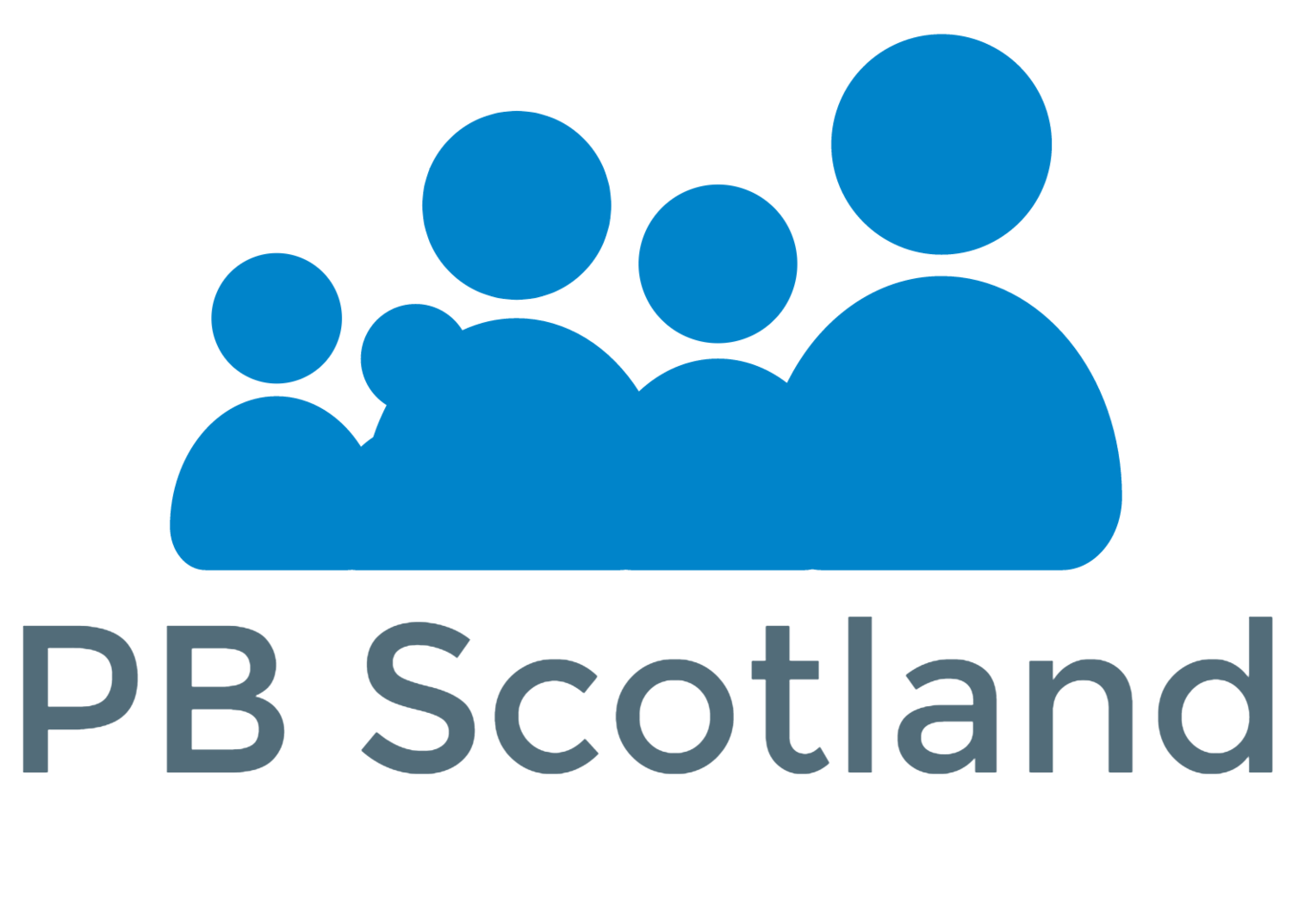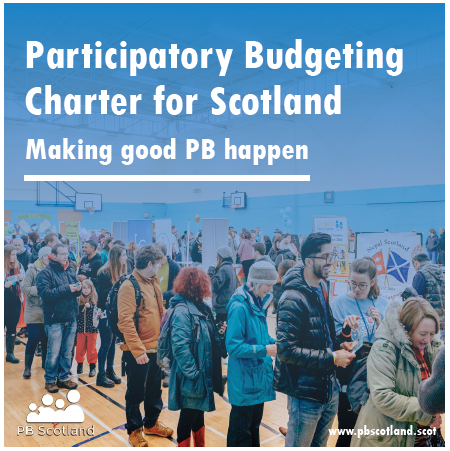Learning event report: Participatory Budgeting in a Digital World
/Fifty-eight people from a variety of organisations in the public, voluntary, education and private sector attended the zoom event. Opening the day, Paul Nelis (SCDC) explained that the purpose of the event is to explore PB solutions, concepts and ideas within the context of the digital world that we are all living in as a result of Covid19. The generative theme for the workshop was: What knowledge, skills and tools do we need to develop an online PB process?
He explained that the current pandemic has put a lot of things on hold, but now we need to consider how we can involve our communities in the discussions about ‘Building Back Better’ using PB and a variety of online tools. We will get back to face to face events but for now we will have to consider digital approaches to engage our communities.
Over the last 4 years The Scottish Government has committed £7m (investment and support) to participatory budgeting and enabled over 122,000 voters to have a direct say in the dispersal of £6.6m at local events from the Borders to Orkney.
Other funder of PB in Scotland include health and social care being, wind farms, charitable trusts. While the impact of PB has been largely positive there is always more work to be done to increase the engagement of communities, Glasgow Caledonian University’s research called for greater involvement and more resources put in to capacity building to give the community the skills and knowledge to participate more fully. Glasgow Disability Alliance (GDA) called for more inclusion of equality groups. And lastly, What Works Scotland called for more opportunity for meaningful dialogue, it is great that people can come along and cast a vote but if there was more dialogue then people who come along can discuss priorities in the community and get in to discussions and perhaps change or amend their views based on positive dialogue.
Participants had the opportunity to participate in all 3 workshops.
Workshops
Going Digital/Staying Local
Gorbals Ideas Fund is a community led PB initiative established in April 2018. In November 2019 they launched their first digital vote, in this workshop Johanna talked about their journey, particularly the challenges of developing and delivering a digital platform at community level with no IT expertise and scant resources.
She highlight the skills needed to encourage participation and the work required to make sure everyone had the opportunity to participate in a community where digital inequality is relatively high.
Johanna discussed the challenges and issues that need to be considered:
The Gorbals Ideas fund needed a software solution that was secure and adaptable and opted for a software (open source) solution from Iceland.
It took 9 months to set up the software - Jo had a very hand on approach and was involved in programme to some extent.
The Ideas Fund now has a bespoke software solution that works for them.
They have a laptop which is dedicated to the software.
They use postcodes to authenticate the votes – there are 344 postcodes in the area.
To support the voting process they also used physical voting postcards.
The top 7 projects were funded.
Some people who were digitally excluded were supported to create an email address and to vote.
781 people voted, and Nicola Sturgeon retweeted the process to encourage people to get involved.
Key point – We need to have readily available software that communities and workers can tap into and use easily. Jo advised that the process took a lot of energy, planning, skills development, volunteer time. Working at this level could easily lead to burnout for community development workers and volunteers on the ground.
Johanna Speirs – Community Budgeting Officer - New Gorbals Housing Association.
GDA Connects
Glasgow Disability Alliance is a community-led organisation for disabled people with 5,000 members. In this workshop, they will share the lessons they’ve learned over the years and refined since lockdown about how to engage and support disabled people to meaningfully participate and contribute, in an increasingly digital world.
Disabled people are 4 times as likely to face digital exclusion, and 60% of GDA members surveyed said they lacked the technology, connectivity or confidence to get online. Since April 2020, the GDA Connects project has distributed hundreds of devices and pieces of equipment to disabled people, along with support to learn how to use them.
Isla & Hannah discussed the challenges of exclusion for people with disabilities:
Hurdles setting up an email account
Technical issues are a barrier for all disabled people – access to hardware, confidence to use new tech, language issues.
Where can people get support to get online?
Recent research showed huge levels of digital exclusion for those people with disabilities Glasgow Disability Alliance (GDA)
Key point – PB processes need to consider those people who are digitally excluded. Things to think about:
How to market the PB process to a diverse community
Use of basic language.
Translation of text.
‘SMS voting’ alongside online approaches.
Leaflets and local radio to tell people about the process.
Telephone calls to register votes.
Identify support organisations in the community that can help people with disabilities to engage.
Hannah Reynolds - Community Development Coordinator - Glasgow Disability Alliance
Isla McIntosh- Community Development Manager-Glasgow Disability Alliance
From Mixed Methods to Digital PB
Renfrewshire Council is in its second year of delivering PB for young people. The fund has been designed by young people from the ground up. Young people choose the funding criteria and award amount on a yearly basis. This ensures those seeking funding will deliver services that young people want and need.
This year the whole process has been done virtually due to COVID 19. In this presentation John will look at the youth PB process design and discuss the different approaches that have been taken over the last 2 years.
John discussed the challenges of working exclusively online:
Used GLOW to link in with young people but this didn’t work well.
Found it difficult to involve young people this year.
Need to give schools more information about PB – what it is and what it can do.
You can’t go fully digital, the process needs face to face approaches as well as digital.
PB needs local champions in the community and in schools to drive the process. It could be a teacher or community organiser.
Key point – We need champions at a local level to be the cheerleader for PB
John Kennedy – Community Learning Officer - Renfrewshire Council Youth Services.
Plenary
It’s reassuring that we are seeing that PB needs to be ‘face to face’ and online – a mixed methods approach. Going digital alone will only go so far and is not resource. PB needs skilled staff in IT and community engagement.
We need to support local workers – to stop burnout.
Could use zoom presentations, breakout rooms with a voting platform alongside as a temporary method while still in lockdown.
Digital PB is labour intensive – we need tried and tested software to speed up the digital process. Online is here to stay and we need to keep moving in this direction – people need support on the ground and information about useful online tools.
Using online platforms can discourage community groups from coming forward but we need to work with the tools we have.
The digital divide is real and we need massive investment in bridging the divide.
There is expertise being built within the community development sector – we need to continue to learn from each other. The citizens assembly is ongoing as a large scale online deliberative process using the zoom platform. We need to learn from this process.
Digital access should be seen as a Human Right. We are to some extent seeing this evolve in Scotland.
‘Connecting Scotland’ (distributing hardware to various communities) is such an important project to tackling the digital divide but there’s lots more to do.
GDA’s ‘Drivers for Change’ is a good example of meaningful discussions between disabled people and service delivery managers online but more needs to be done to get more people online and engaged.
Key links
Using SMS https://www.participatorybudgeting.org/sms-outreach-civic-engagement/
Video from Portugal on SMS might be useful too: https://www.youtube.com/watch?v=Pq2xub0-VX8
Online PB process in Finland https://mun.tampere.fi/?locale=en








